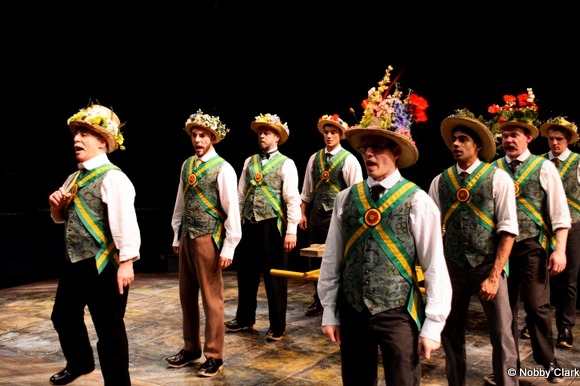An August Bank Holiday Lark (Tour – Lancaster)
Michael Nunn and is amused and moved by this latest Northern Broadsides production

© Nobby Clark
With the centenary of the start of World War I, there was bound to be an onslaught of new works for theatre, and regionally-based Northern Broadsides started work on their contribution to the commemorations some five years ago. An August Bank Holiday Lark, by Deborah McAndrew, offers us an extended snapshot view of rustic-industrial life in Saddleworth, a northern village in the exposed heights of the Pennines.
For centuries part of Yorkshire and now in Greater Manchester, its industries have been cloth manufacture, cotton spinning and weaving. In the prelude to World War I, rural pursuits and rituals such as rushbearing, Morris dancing, village bands, Whitsuntide Walks, cycling clubs and the like were still very much alive all across England. Pick up any Hardy novel or ask your grandparents to get a flavour of the times.The redoubtable Yorkshire bard Alan Bennett captured this atmosphere beautifully in his elegiac A Day Out of 1972.
Against such a background is McAndrew’s narrative set. It tells of the close-knit community’s preparations for the annual Wakes Week celebrations (a week’s paid holiday whilst the local mills or factories were closed for maintenance), and especially the rushbearing ceremony. This was carried out religiously every year – and still is in some rural northern towns and villages – and was the absolute focus of the locals’ energies and creativity – and also not a little squabbling, power-struggling and rivalry.
The preparations for the Big Day are well on, under the gimlet eye of Squire (organiser) John Farrar (Barrie Rutter) with his hapless Bagman (assistant) Jim Haworth (Andrew Whitehead). The huge, authentic and spectacular nine-foot Rushcart is built, with the actual rushes used at the neighbouring Sowerby Bridge local festival last year. The Morrismen are rehearsed, and the village’s distinctive banner is finally unveiled.
In summer 1914, though, with the imminent onset of hostilities, several of the local lads are enlisting. But at least one young man’s sap has begun to rise. Young Frank Armitage (Darren Kuppan) has his eye set on Squire Farrar’s daughter, Mary (Emily Butterfield). The Squire is aghast though the womenfolk and the other men encourage the match.
Nothing can get in the way of the festivities, and we are treated to vivid displays of traditional Northern clogdancing from the eight men, admirably accompanied by some fine, exuberant dance tunes by MD and choreographer Conrad Nelson.
But the clouds are gathering. As the village lads return to the Front after a brief furlough, McAndrew’s tale suitably darkens, and the effects of far-off conflict, which was even less understood then than now, take their toll on one and all.
There is not, however, a trace of maudlin or sentimentality in this tale, which is told authentically and with great dramatic integrity Director Rutter gives us convincingly authentic Northern accents (around half the cast hail from the White Rose County), sure movement and blocking on a simple and robust set designed by Liz Evans, with unobtrusive and effective lighting by Mark Howland. The Saddleworth Morris Men assisted in the dancing.
The cast of twelve deliver a compelling unravelling of this proudly distinctive Northern narrative, leaving even the least emotional lip a quiver.
An August Bank Holiday Lark is at the Dukes, Lancaster until 8 March and is touring nationally until 14 June.
– Michael Nunn












